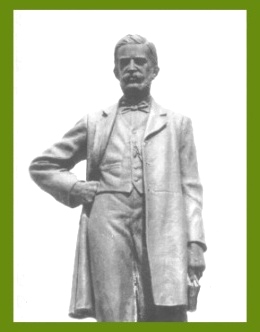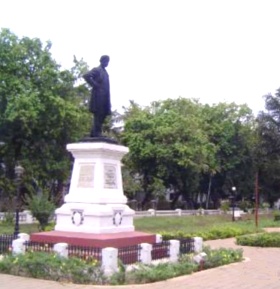A forgotten Goan genius
 He was one of the most prominent intellectuals in nineteenth century Goa. An illustrious parliamentarian who represented Goa in the Cortes Gerais – the Portuguese Parliament in Lisbon, he was widely acclaimed as one of the best in Europe in his time. He was lauded as the “Prince of Intellectuals” in Europe for his remarkable contributions in the fields of philosophy and economics, and even felicitated by the French emperor Napoleon III (nephew of Napoleon Bonaparte). Yet, this internationally renowned, great Goan genius – Dr. Francisco Luis Gomes – remains pretty much forgotten in his home state of Goa.
He was one of the most prominent intellectuals in nineteenth century Goa. An illustrious parliamentarian who represented Goa in the Cortes Gerais – the Portuguese Parliament in Lisbon, he was widely acclaimed as one of the best in Europe in his time. He was lauded as the “Prince of Intellectuals” in Europe for his remarkable contributions in the fields of philosophy and economics, and even felicitated by the French emperor Napoleon III (nephew of Napoleon Bonaparte). Yet, this internationally renowned, great Goan genius – Dr. Francisco Luis Gomes – remains pretty much forgotten in his home state of Goa.
Yes, there are the token reminders – a road in Vasco, a district library in Navelim – the village he hailed from, and the bridge linking Margao to Navelim have been named after him, a bust has been installed near the Comunidade Building in Margao, and a crumbling disproportionately tiny bust of the great man sits atop a large pedestal in the grounds of the Rosary High School in Navelim. Ironically, the most striking monument to Dr. Gomes was erected way back in 1931 by the Portuguese government whose unjust policies he had fearlessly denounced. A stately, life-size bronze statue of Dr. Francisco Luis Gomes mounted on a pedestal with inscriptions extolling his many achievements was inaugurated by the then Portuguese governor general on December 23, 1931. It was a grand event held as part of the birth centenary celebrations of the legendary figure that had commenced in 1929. The statue stands in a garden named after Dr. Gomes in the Campal area of Panjim next to the Kala Academy.
Making his mark as a celebrated economist and the greatest Goan
Francisco Luis Gomes was born in the Colmoroddo vaddo of Navelim village in Salcette, Goa on May 31, 1829, the same day on which another great Goan, Abbé Faria, was born around seven decades earlier. The son of Dr. Francisco Salvador Gomes, an eminent physician and community leader, and Deodata Furtado, he completed his medical studies at the Escola Médico–Cirúrgica de Goa in Panjim at the young age of 21, rising to the position of Chief Surgeon at this institution later on.
In 1861, when he was barely 32 years old, Dr. Gomes was elected to the Portuguese Parliament for the first time. Being strongly influenced by the principles of the French Revolution, he decided to join a liberal party – ‘O Regenerador’, the Portuguese Democratic Party. From his very first speech in Parliament, he impressed the other parliamentarians and the general public with his superb debating skills, and not surprisingly went on to become one of the leaders of his party. Elected to the Portuguese Parliament two more times, during his 9-year tenure he made his mark as a multi-talented personality winning acclaim as a distinguished orator, economist, political scientist, physician, social activist, historian, journalist, and philosopher.
Dr. Gomes vehemently opposed socio-economic injustices perpetrated on the people in Portuguese colonies and proposed economic reforms for these territories. He demanded the withdrawal of the marriage and death taxes as well as those imposed on toddy tappers in Goa. Offered a seat in the Portuguese Cabinet as a Minister thrice, he declined the offer each time since such a position would clash with his independent views.
Francisco Luis Gomes had a flair for languages. Besides his mother tongue Konkani, he was proficient in Portuguese and French, and had a sound grasp over English, Latin, Italian, Spanish, and Marathi. He was also a versatile writer. He made a significant contribution towards a revised edition of the classic ‘Konkani Grammar‘ originally written by the English Jesuit, Fr. Thomas Stevens. He wrote six books in Portuguese and French besides contributing a large number of articles on political economy, law and ethics, history and literature to prominent journals. Published in 1862, his book in Portuguese focusing on the impact of Portuguese colonial policy on Goan agriculture and titled “A liberdade da terra” (The freedom of the land) is considered to be his principal work and a masterpiece.
Os Brâmanes (The Brahmins)
In 1866, Dr. Gomes wrote his celebrated historical novel Os Brâmanes (The Brahmins), which drew attention to the injustice of the caste-based discrimination in India, and exposed two types of Brahminism – the type practiced by the British and that prevalent among the Hindus. In the novel, written much before the Indian National Congress was established, he also championed the cause of self-governance for Indians and slammed the European nations for not staying true to the Christian values of equality and fraternity by writing, “It is said that the law of Christ governs European civilization. That is a lie. It shines on its surface, but does not penetrate to its entrails.” Set against an Indian background, the novel was the first to be penned in Portuguese by a Goan.
Rare honours for the Prince of Intellectuals
 For his outstanding contributions in varied fields, Francisco Luis Gomes was showered with numerous honours. To name a few, the Society of Economists of Paris appointed him as an Associate Member, a rare honour that was accorded to only a handful of reputed public figures including British luminaries like the statesman Gladstone, the political economist John Stuart Mill, and the statesman and thinker Richard Cobden; he was offered a public tribute by elite French economists and philosophers on the occasion of the Universal Exhibition held in Paris in 1867; and the French monarch Napoleon III welcomed him in a special audience and commended him for his many accomplishments.
For his outstanding contributions in varied fields, Francisco Luis Gomes was showered with numerous honours. To name a few, the Society of Economists of Paris appointed him as an Associate Member, a rare honour that was accorded to only a handful of reputed public figures including British luminaries like the statesman Gladstone, the political economist John Stuart Mill, and the statesman and thinker Richard Cobden; he was offered a public tribute by elite French economists and philosophers on the occasion of the Universal Exhibition held in Paris in 1867; and the French monarch Napoleon III welcomed him in a special audience and commended him for his many accomplishments.
Liberty and light for India!
Gomes was a staunch nationalist and an upright politician, a rarity in current day Indian politics. In a letter to his friend Lamartine, the famed French poet and politician, he wrote that he belonged to the great land that was the birthplace of the Mahabharata and had invented chess. He concluded the letter with a call for self-rule for India, proclaiming, “I ask for India liberty and light!”
Unfortunately, in 1869, Gomes was afflicted with a serious ailment that reduced him almost to a skeleton. Wishing to spend his last days in the land of his birth, he boarded the S. S. Messalis that set sail for India on 25 September. But just five days later, on 30 September, he passed away on board the ship and his body was consigned to the waters of the Mediterranean Sea. He was only 40.
A brief life span, but what a rich legacy Dr. Francisco Luis Gomes has left behind! At the commemoration of his death centenary in 1969, the well-known historian Dr. George M. Moraes ended his tribute to Dr. Gomes with the words: “He was the greatest Goan that has ever lived.” The question is: Are we Goans doing enough to keep his memory alive and ensure he gets the appreciation he deserves?

I am extremely proud of being one of the descendants of Francisco Luis Gomes who was my great, great, great uncle. Tomorrow, my daughter will receive her diploma in Economics with distinction.
I would like to keep the memory of my ancestor Dr. Gomes alive and contribute, if possible, towards organising the 200th anniversary of his birth. I am also looking for different versions of his books.
I hope that we will keep in touch.
It’s a pleasure to make contact with you Teresa. Dr. Gomes was certainly one of the most outstanding sons of Goa and any celebration to commemorate his 200th birth anniversary and his legacy should be in keeping with his stature. Do keep in touch. And many congratulations to your daughter. She is obviously showing signs of excelling as an economist just like your illustrious ancestor.
I was delighted to read about this illustrious personality.
I was curious to know about him since I too am from Navelim, the village Mr. F. L. Gomes belonged to. I have heard about him and of course seen his statue in the Rosary High School campus during my school days.
I was curious to know if I was related to him since I share his surname and come from the same village.
Glad you enjoyed reading this post Fr. Gomes. I too share the same family name, and was curious too! Since your family comes from Navelim, chances are there could be some connection. Maybe you could check the church records, the archdiocese records of births and deaths, the Goa archives… the Portuguese have left well documented records and many Goans have been able to trace their ancestors till around the 1800s. Start with the names of your grandparents or great-grandparents, and take it from there. All the best!